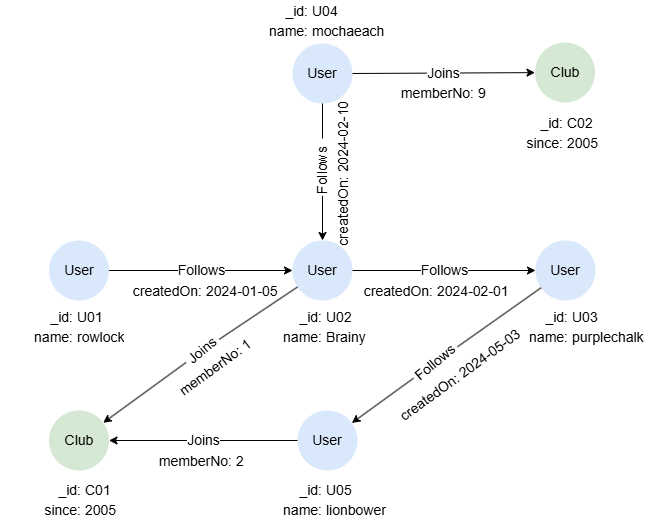OPTIONAL MATCH
Overview
OPTIONAL MATCH functions similarly to MATCH in that it attempts to find patterns in the graph, but it tolerates the absence of matches:
MATCH: If a graph pattern has no matches, it returns no records.OPTIONAL MATCH: If a graph pattern has no matches, it returns anullvalue.
The OPTIONAL keyword can be applied to a single MATCH statement, or to a block of MATCH statements.
Example Graph

CREATE GRAPH myGraph { NODE User ({name string}), NODE Club ({since uint32}), EDGE Follows ()-[{createdOn date}]->(), EDGE Joins ()-[{memberNo uint32}]->() }
Checking Existence
The user rowlock hasn't joined the club C01, therefore this query yields no results:
GQLMATCH (:User {name: "rowlock"})->(c:Club {_id: "C01"}) RETURN c
Result: No return data
If uses OPTIONAL MATCH, the query returns a row with null, indicating the absence of the match:
GQLOPTIONAL MATCH (:User {name: "rowlock"})->(c:Club {_id: "C01"}) RETURN c
Result:
| c |
|---|
null |
Retaining All Incoming Records
In this query, the two MATCH statements are equi-joined on the common variable u:
GQLMATCH (u:User) MATCH (u)-[:Joins]->(c:Club) RETURN u.name, c._id
Result:
| u.name | c._id |
|---|---|
| mochaeach | C02 |
| Brainy | C01 |
| lionbower | C01 |
If we replace the second MATCH with OPTIONAL MATCH, the result sets of the two statements are left-joined, meaning all records from the first MATCH are preserved:
GQLMATCH (u:User) OPTIONAL MATCH (u)-[:Joins]->(c:Club) RETURN u.name, c._id
Result:
| u.name | c._id |
|---|---|
| mochaeach | C02 |
| Brainy | C01 |
| rowlock | null |
| lionbower | C01 |
| purplechalk | null |
Keeping the Query Running
In the case when a statement produces empty results, the query halts at that point, as there is no data for subsequent statements to operate on.
For example, the following query has no return because the MATCH fails to find a matching node. As a result, the RETURN is never executed.
GQLMATCH (u:User) WHERE u.name = "Masterpiece1989" RETURN CASE WHEN u IS NULL THEN "User not found" ELSE u END
Result: No return data
To ensure that the query continues executing even when no match is found, use OPTIONAL MATCH:
GQLOPTIONAL MATCH (u:User) WHERE u.name = "Masterpiece1989" RETURN CASE WHEN u IS NULL THEN "User not found" ELSE u END
Result: User not found
The Evaluation of WHERE
When using OPTIONAL MATCH, keep in mind that the WHERE clause is evaluated during pattern matching, i.e., before the OPTIONAL logic is applied, not after.
This query returns users who have no followers:
GQLMATCH (n:User) OPTIONAL MATCH p = (n)<-[:Follows]-() FILTER p IS NULL RETURN COLLECT_LIST(n.name) AS Names
Result:
| Names |
|---|
| ["mochaeach","rowlock"] |
You won’t get the expected results if replaces FILTER with WHERE, since the WHERE clause is evaluated before OPTIONAL is applied:
GQLMATCH (n:User) OPTIONAL MATCH p = (n)<-[:Follows]-() WHERE p IS NULL RETURN COLLECT_LIST(n.name) AS Names
Result:
| Names |
|---|
| ["mochaeach","Brainy","rowlock","lionbower","purplechalk"] |
Optional MATCH Block
You can wrap multiple MATCH statements inside braces {} or parentheses () and apply OPTIONAL to the entire block. This means that the whole block is treated as a unit: if any part of it fails to match, it doesn't stop the query—instead, it returns null for all variables introduced inside that block.
GQLFOR name IN ["rowlock", "Masterpiece1989", "Brainy"] OPTIONAL { MATCH (u:User) WHERE u.name = name MATCH (u)->(c:Club) } RETURN table(name, u.name, c._id)
Result:
| name | u.name | c._id |
|---|---|---|
| rowlock | null | null |
| Masterpiece1989 | null | null |
| Brainy | Brainy | C01 |